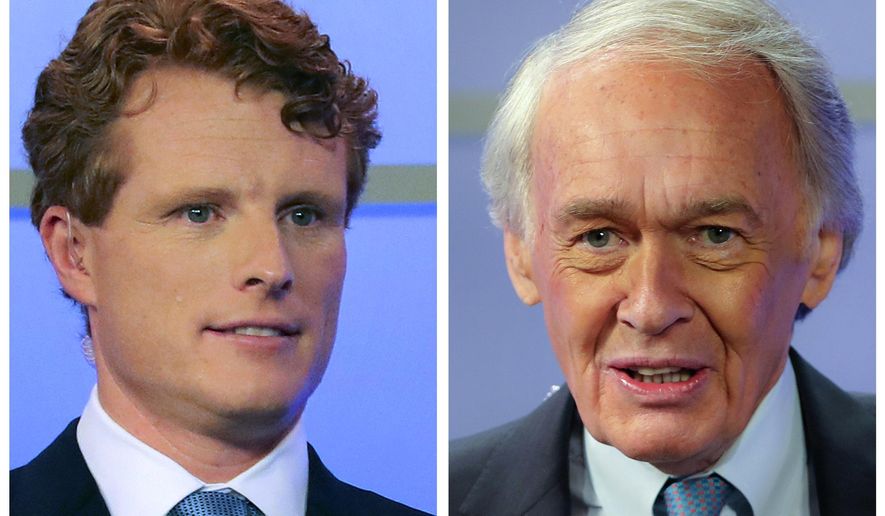The Massachusetts Senate race has turned Democratic politics on its head as dyed-in-the-wool liberal Sen. Edward J. Markey faces a fierce primary challenge Tuesday from Kennedy family scion Rep. Joseph P. Kennedy III.
Mr. Kennedy, 39, is trying to become the latest young liberal to topple an establishment incumbent. But Robert F. Kennedy’s grandson is facing an uphill battle with both candidates running on staunchly liberal records in one of the bluest of blue states.
David Paleologos, director of the Political Research Center at Suffolk University, said that similarity has driven the race into a policy versus persona dynamic, with Mr. Markey up against the Kennedy family legacy.
“Markey has been so underrated and overshadowed for many, many years by these giants in national and state politics like John Kerry, Elizabeth Warren, Mike Dukakis, Deval Patrick, Ted Kennedy,” Mr. Paleologos said.
“If you had said to me 15 years ago, ’Ed Markey is going to be the candidate that defeats the first Kennedy in Massachusetts in a Democratic primary,’ I don’t think I or any clear-thinking person would have said, ’Oh, really. I could see that,’” he added.
Mr. Markey has even been criticizing the Kennedy family, which would have been political suicide a decade ago. He has been going after the family’s fame and fortune in debates against Mr. Kennedy and on the campaign trail.
One ad makes a reference to President Kennedy’s famous “Ask what you can do for your country” quote.
“We asked what we could do for our country. We went out, we did it,” Mr. Markey says in the ad. “With all due respect, it’s time to start asking what your country can do for you.”
Mr. Markey, who represented Massachusetts’ 7th Congressional District in the House from 1976 to 2013, was elected to the Senate the same year that Mr. Kennedy won his seat in the state’s 4th District.
Mr. Markey, 74, has managed to beat back criticism about his “establishment” credentials as more liberals win seats in Congress by strategically positioning himself on key issues in recent years.
Three longtime Democratic members of Congress, including House Foreign Affairs Committee Chairman Eliot Engel of New York, lost their seats to liberal primary challengers this year. Meanwhile, three members of the liberal “Squad” — Reps. Alexandria Ocasio-Cortez of New York, Rashida Tlaib of Michigan, and Ilhan Omar of Minnesota — all dominated their primary races this cycle.
“There is some reaction to and some from frustration with members of Congress who’ve been serving for a long time. And Markey — he is one of those people,” Jesse Rhodes, chairman and professor of political science and associate director of the University of Massachusetts Poll, told The Washington Times. “However, due to his record and his very careful and strategic positioning in recent years, he has somewhat blunted that criticism because he’s not as easy to portray as moderate.”
Mr. Rhodes cited the senator’s close alignment with Ms. Ocasio-Cortez on the Green New Deal as a prime example.
Mr. Markey helped introduce the freshman congresswoman’s flagship resolution just one month into her term. By doing so, he appealed directly to the young, liberal and active base of voters she attracts.
“He was very smart politically and has benefited greatly from aligning himself in this way,” Mr. Rhodes said. “That’s not to say it’s not genuine, but it was also very important in that it helped him signal his concern for these issues that are really important to progressives.”
Mr. Markey also gained an edge by locking down local support from state teachers unions, a key liberal group called the Sunrise Movement, The Boston Globe and several members of Massachusetts’ congressional delegation, Mr. Rhodes said.
Several polls last week showed Mr. Markey with a significant lead — in two of them, a double-digit advantage well outside of the survey’s margin of error.
According to a recent poll of 500 registered voters from the University of Massachusetts at Amherst, Mr. Markey has shown a surge of support. About 50% said they would support him if the election were held now, whereas only 32% said the same for Mr. Kennedy. In February, the poll showed the two candidates nearly tied.
An Emerson College/7 News poll released Friday showed Mr. Markey with a double-digit lead of 56% to 44%, a reversal from its May survey when Mr. Kennedy was leading 58% to 42%.
Still, political experts said the race isn’t over.
“I don’t think we can completely count Kennedy out. This race has become very vigorously fought, very tough rhetoric coming from both candidates,” Jesse Rhodes, chairman and professor of political science and associate director of the UMass Poll, told The Times. “It’s certainly by no means a done deal, but Markey does seem to be going into Election Day with an advantage.”
Mr. Kennedy did pick up a key endorsement this month from House Speaker Nancy Pelosi, California Democrat, but he has his work cut out for him.
Mr. Paleologos, whose Suffolk University Poll found Mr. Markey ahead by 10 points last week, said Mr. Kennedy will have to turn out voters in urban and suburban areas who weren’t necessarily planning to vote.
That is going to be especially challenging because early mail-in ballots have shrunk the pool of remaining voters, he said.
“It can be done if he pulls the right voters out,” Mr. Paleologos said. “There’s obviously enough good will for Kennedy himself — the candidate and the family. They’re out there. He’s got to find them and motivate them. And that’s going to be a challenge.”
• Gabriella Muñoz can be reached at gmunoz@washingtontimes.com.




Please read our comment policy before commenting.